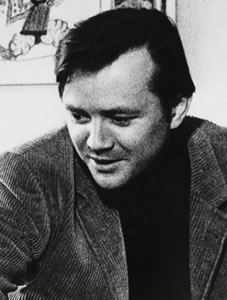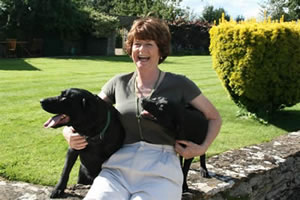De Duitse schrijver Jochen Schimmang werd geboren op 14 maart 1948 in Leer, Ostfriesland. Zie ook alle tags voor Jochen Schimmang op dit blog.
Uit: Das Beste, was wir hatten
„Kinder, dachte er, beinahe sind es noch Kinder. Jünger als Nott und ich damals. Der Junge war schlank, nicht besonders groß, wirkte aber sehr kräftig. Seine Haare waren das, was man strohblond nennt, die Augen irritierend blau. Das Mädchen erinnerte ihn ein bisschen an Reni Fuchs. Sie ballte auf eine Art die kleinen Hände zu Fäusten und presste dann die Fingerknöchel gegeneinander, wie es Reni auch oft getan hatte. Oder noch immer tat: Letztes Jahr in Maastricht, als sie Carl in Sicherheit gebracht hatten, hatte er das wieder an ihr beobachtet. Sie trug auch ihr dunkles Haar ähnlich wie Reni. Vielleicht kommt der Fransenpony wieder in Mode, dachte er.
»Seid ihr abgehauen?«, fragte er schließlich.
Der Junge schüttelte den Kopf.
»Wir wollen nur nicht, dass man unseren Schuppen entdeckt«, sagte er. »Wir gehen ganz normal zur Schule.«
Er zeigte auf die beiden Regale an der linken Wand. Gregor sah Bücher darin, Vorräte, einen Discman, auch ein paar Kleidungsstücke. An der rechten Wand stand eine kleine Liege. Gregor entdeckte in der Ecke zwei große Kanister.
»Wir haben das alles selbst gemacht hier«, sagte der Junge. »Wir wollen uns das nicht wegnehmen lassen. Sie sind der Erste, der hierher gekommen ist. Deshalb musste ich Sie durchsuchen.«
Gregor nickte; dann hörte er zum ersten Mal die Stimme des Mädchens. Es war eine volle, nachklingende Stimme, ein überraschend dunkler Glockenton, und doch klang sie so, als wolle sie ihr eigenes Volumen zurücknehmen, als spräche sie gleichsam unter Vorbehalt.
»Björn hat es nicht persönlich gemeint«, sagte sie. »Wir müssen uns schützen.« Nach einer Pause: »Wir sind Außenseiter, verstehen Sie.«
»Du bist also Björn«, sagte Gregor.
Der Junge nickte. »Kann nichts dafür, dass meine Eltern mich so genannt haben. Der Name war schwer in Mode, damals. Meine Freundin heißt Pia.«

Jochen Schimmang (Leer, 14 maart 1948)
De Franse schrijver Olivier Delorme werd geboren op 14 maart 1958 in Chalon-sur-Saône. Zie ook alle tags voor Olivier Delorme op dit blog.
Uit: Le Chateau Du Silence
Mais pourquoi est-ce que je ne peux m’empêcher
De crier ?
Pense l’Homme dont le corps est tendu comme un arc,
Comme un pont entre la vie et la mort.
Pour être entendu ?
De qui ?
Qui pourrait nous entendre ?
Nous qui sommes enterrés vivants.
Depuis combien de temps ?
Au début,
Tous,
Ils avaient compté.
Mais après cinq années…
Depuis,
Tous,
Ils avaient renoncé à compter
Les jours, les semaines, les mois, les années…
Le temps des hommes.
Depuis,
Tous,
Ils se contentaient du jour par le soupirail
Ou de la nuit ;
Du froid de l’hiver
Ou bien de la chaleur…
Le temps des bêtes.
Parfois, cependant,
L’un d’eux reprenait ce qu’il faut bien nommer
Espoir.
Il tentait alors de se souvenir ;
Combien d’hivers et combien de chaleurs à crever ?
Mais tous,
Toujours,
Ils se trompaient.

Olivier Delorme (Chalon-sur-Saône, 14 maart 1958)
De Amerikaanse schrijver en draaiboekauteur Horton Foote werd geboren op 14 maart 1916 in Wharton, Texas. Zie ook alle tags voor Horton Foote op dit blog.
Uit: Blind Date
„DOLORES. Now where were we? Oh yes. I was going over my list of things to talk about. (Dolores picks up her list and begins reading) One: Who is going to win the football game next Friday? Two: Do you think we have had enough rain for the cotton yet? Three: I hear you were a football player in high school. What position did you play? Do you miss football? Four: I hear you are an insurance salesman. What kind of insurance do you sell? Five: What is the best car on the market today, do you think? Six: What church do you belong to? Seven: Do you enjoy dancing? Eight: Do you enjoy bridge? (She puts the list down) All right, that will do for a start. Now let’s practice. I’ll be Felix. Now. Hello, Sarah Nancy. (a pause. Sarah Nancy looks at her like she thinks she’s crazy) Nnow what do you say, Sarah Nancy?
SARAH NANCY. About what?
DOLORES. About what? About what you say when someone says hello to you, Sarah Nancy. Now let’s start again. Hello, Sarah Nancy.
SARAH NANCY. Hello.
DOLORES. Honey, don’t just say hello and above all don’t scowl and say hello. Smile. Hello, how very nice to see you. Let me feel your warmth. Now will you remember that? Of course you will. All right, let’s start on our questions. Begin with your first question. (A pause) I’m waiting, honey.
SARAH NANCY. I forgot.
DOLORES. Well, don’t be discouraged. I’ll go over the list carefully and slowly again. One: Who is going to win the football game next Friday? Two: Do you think we have had enough rain for the cotton yet? Three: I hear you were a football player in high school. What position did you play? Do you miss football? Four: I hear you are an insurance salesman. What kind of insurance do you sell? Five: What is the best car on the market today, do you thin
k? Six: What church do you belong to? Seven: Do you enjoy dancing? Eight: Do you enjoy bridge? Now we won’t be rigid about the questions, of course. You can ask the last question first if you want to.
SARAH NANCY. What’s the last question again?“

Horton Foote (14 maart 1916 – 4 maart 2009)
De Duitse dichter Volker von Törne werd geboren op 14 maart 1934 in Quedlinburg. Zie ook alle tags voor Volker von Törne op dit blog.
Idylle
Im Gras zirpt eine Grille
Im Dorfe bellt ein Hund
Wie ist die Nacht so stille
Leg dich zu mir, Sybille
Und reich mir deinen Mund
Der Wind riecht nach Kamille
Nach Rosen und nach Raps
Leg dich zu mir, Sybille
Dein Mund hat mehr Promille
als scharfer Zwetschgensaft
Streif ab die letzte Hülle
Die dich von mir noch trennt
Ich teil mit dir die, Sybille
Des Sommers dunkle Fülle
Was man so Liebe nennt
Leg dich zu mir, Sybille
Warum bist du so scheu?
Wozu gibt es die Pille?
Im Gras zirpt eine Grille
Leg dich zu mir ins Heu
So ist es Gottes Wille
Er schuf ja auch das Heu
Er schuf im Gras die grille
Und mich und dich, Sybille
Und auch die Nacht: Ahoi

Volker von Törne ( 14 maart 1934 – 30 december 1980)
De Britse dichteres van humoristische poëzie Pam Ayres werd geboren op 14 maart 1947 in Stanford in the Vale in Berkshire (tegenwoordig Oxfordshire). Zie ook alle tags voor Pam Ayres op dit blog.
The Dolly on the Dustcart
I’m the dolly on the dustcart,
I can see you’re not impressed,
I’m fixed above the driver’s cab,
With wire across me chest,
The dustman see, he noticed me,
Going in the grinder,
And he fixed me on the lorry,
I dunno if that was kinder.
This used to be a lovely dress,
In pink and pretty shades,
But it’s torn now, being on the cart,
And black as the ace of spades,
There’s dirt all round me face,
And all across me rosy cheeks,
Well, I’ve had me head thrown back,
But we ain’t had no rain for weeks.
I used to be a ‘Mama’ doll,
Tipped forward, I’d say, ‘Mum’
But the rain got in me squeaker,
And now I been struck dumb,
I had two lovely blue eyes,
But out in the wind and weather,
One’s sunk back in me head like,
And one’s gone altogether.
I’m not a soft, flesh coloured dolly,
Modern children like so much,
I’m one of those hard old dollies,
What are very cold to touch,
Modern dolly’s underwear,
Leaves me a bit nonplussed,
I haven’t got a bra,
But then I haven’t got a bust!
But I was happy in that doll’s house,
I was happy as a Queen,
I never knew that Tiny Tears,
Was coming on the scene,
I heard of dolls with hair that grew,
And I was quite enthralled,
Until I realised my head
Was hard and pink… and bald.
So I travel with the rubbish,
Out of fashion, out of style,
Out of me environment,
For mile after mile,
No longer prized… dustbinised!
Unfeminine, Untidy,
I’m the dolly on the dustcart,
And there’s no collection Friday.

Pam Ayres (Stanford in the Vale, 14 maart 1947)
Zie voor nog meer schrijvers van de 14e maart ook mijn vorige blog van vandaag.




